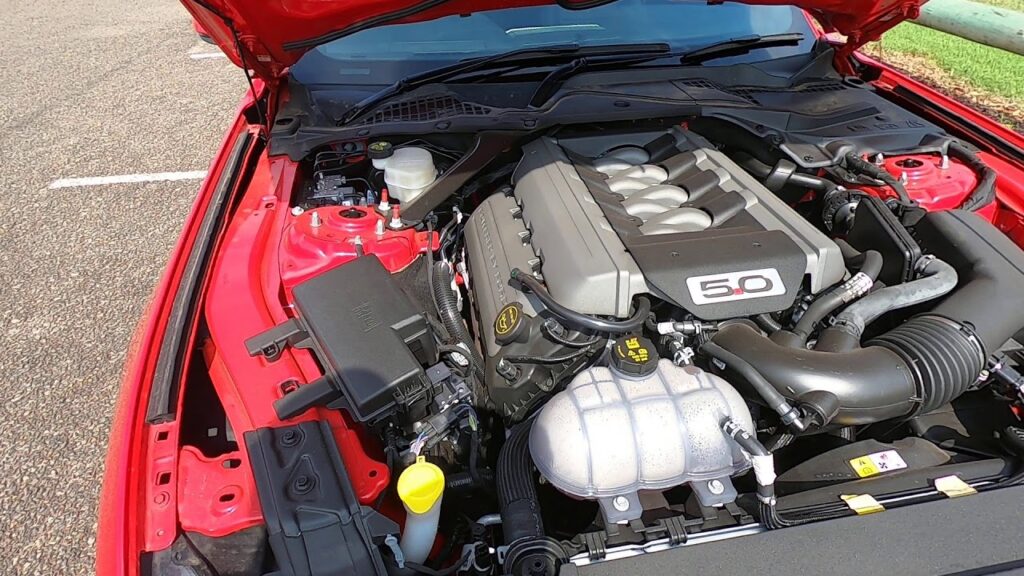The weight of the 2018 Mustang GT varies depending on the model and configuration, with the standard GT coupe weighing around 3,705 lbs (1,680 kg). Factors like the trim level, body style, and additional features can influence its weight, affecting performance, fuel efficiency, and handling characteristics.
When it comes to muscle cars, the 2018 Ford Mustang GT is one of the most iconic and well-loved models in recent years. One of the key aspects that car enthusiasts, potential buyers, and owners alike are curious about is the vehicle’s weight. Knowing the weight of the 2018 Mustang GT is essential for comprehending its performance, handling, and efficiency.
In this article, we will explain every facet of the Mustang GT’s weight, including how it compares to other vehicles, the impact of weight on performance, and how various configurations can affect it.

Contents
- 1 What is Curb Weight and Why Does it Matter?
- 2 Curb Weight Specifications of the 2018 Mustang GT
- 3 Factors Influencing the Weight of the Mustang GT
- 4 Performance Impact of Weight on the Mustang GT
- 5 Modifying the Weight of the 2018 Mustang GT
- 6 Comparison to Other Muscle Cars
- 7 Frequently Asked Questions
- 8 Conclusion
What is Curb Weight and Why Does it Matter?
The curb weight of a vehicle is a critical measurement, as it indicates the total weight of the vehicle with all necessary fluids, including oil, coolant, and a full tank of fuel, but without passengers or cargo. For the 2018 Ford Mustang GT, this weight can vary depending on the specific model and configuration. The curb weight is an important factor because it affects many aspects of the vehicle, such as:
- Fuel Efficiency: Heavier vehicles generally consume more fuel as they require more power to move.
- Performance: A lighter car can accelerate faster and handle better, but too little weight can sometimes compromise stability.
- Braking and Handling: More weight typically means longer braking distances, but it can also contribute to better grip on the road, especially in a high-performance car like the Mustang GT.
Curb Weight Specifications of the 2018 Mustang GT
The curb weight of the 2018 Mustang GT varies slightly depending on the trim, engine choice, and other options. Here’s an overview of the weight of the most common configurations of the Mustang GT:
- Standard GT Coupe: The standard 2018 Ford Mustang GT coupe with a 5.0L V8 engine weighs around 3,705 lbs (1,680 kg).
- GT Premium Coupe: This version, which includes additional premium features and trim options, has a curb weight of about 3,706 lbs (1,681 kg).
- GT Fastback: The GT Fastback model, equipped with more advanced features, weighs in at about 3,860 lbs (1,749 kg).
- GT Convertible: The GT Convertible, due to its reinforced frame and design, weighs more at approximately 4,000 lbs (1,814 kg).
These weights are reflective of the standard configurations and can vary based on optional features and packages, such as the Performance Package or additional interior features. The weight of a car is not just about the raw numbers, but how that weight is distributed, which can influence both its performance and driving dynamics.
Factors Influencing the Weight of the Mustang GT
Several elements affect the overall weight of the 2018 Ford Mustang GT. Here are the key factors:
Engine Type
The heart of the 2018 Mustang GT is the 5.0L V8 engine, which is a heavy yet powerful component. Larger, more powerful engines like the V8 naturally add more weight to the car.
Transmission Type
The type of transmission also plays a role in the overall weight. A manual transmission is generally lighter than an automatic transmission. Therefore, a Mustang GT with a manual gearbox will weigh slightly less than one with an automatic transmission, although the difference might be minimal.
Trim and Options
Different trims and optional features add weight to the vehicle. For example, the GT Premium trim comes with more luxury features like a higher-quality interior, additional technology, and sound systems, all of which increase the overall weight.
Body Style
The body style of the vehicle can influence its weight. For instance, the GT Convertible is heavier than the coupe version because of the extra reinforcements required for the convertible roof system.
Additional Packages
The Mustang GT offers several optional packages, such as the Performance Package or the MagneRide Damping System, which can add additional weight but improve overall performance and handling.

Performance Impact of Weight on the Mustang GT
The weight of a car plays a critical role in its performance, and the 2018 Ford Mustang GT is no exception. Here’s how the Mustang GT’s weight affects its key performance attributes:
Acceleration
The Mustang GT is a high-performance car, and while weight can affect its acceleration, the powerful 5.0L V8 engine compensates for the added weight. The 0-60 mph time for the 2018 Mustang GT is an impressive 4.0 seconds for the manual transmission version. However, compared to lighter sports cars, a heavier Mustang GT may experience a slight delay in acceleration.
Handling and Cornering
A heavier car, while stable at high speeds, may not have the same agility as lighter sports cars when cornering. However, Ford has engineered the Mustang GT with a good balance of weight distribution, and its performance package options help mitigate any potential handling issues. Still, lighter vehicles often feel more nimble.
Braking
The Mustang GT’s braking system is designed to handle its weight, with large disc brakes at the front and rear. However, heavier cars typically have longer stopping distances due to the increased mass. Despite this, the Mustang GT has a very responsive braking system that provides excellent stopping power for a vehicle of its weight.
Fuel Efficiency
A heavier car consumes more energy to accelerate and maintain speed, which directly impacts fuel economy. The 2018 Mustang GT achieves an estimated 15 mpg in the city and 25 mpg on the highway with the manual transmission, which is relatively efficient considering the vehicle’s power output and weight.
Modifying the Weight of the 2018 Mustang GT
Enthusiasts often look for ways to reduce the weight of their vehicles to improve performance. The 2018 Mustang GT is no different, and there are several aftermarket modifications that can help reduce weight without sacrificing safety or comfort.
Lightweight Wheels
Swapping out the stock wheels for lightweight forged aluminum wheels is one of the most common weight-reduction modifications. Forged wheels are significantly lighter than standard cast wheels and can shave off a few pounds, which can improve both performance and fuel efficiency.
Carbon Fiber Parts
Replacing heavy parts such as the hood, spoilers, or rear trunk lid with carbon fiber alternatives is another way to reduce weight. Carbon fiber is incredibly strong yet light, and it offers a substantial weight savings while maintaining the car’s structural integrity.
Aftermarket Exhaust Systems
Upgrading to an aftermarket exhaust system can not only improve the sound of your Mustang GT but can also help reduce weight. Lighter exhaust systems made from materials like titanium or aluminum can shave off several pounds.
Removing Non-Essential Features
Some Mustang owners opt to remove features such as rear seats, floor mats, or even the sound system to reduce the vehicle’s weight. While this is a more extreme measure, it can improve performance, especially in track situations.
Comparison to Other Muscle Cars
When comparing the 2018 Mustang GT to other muscle cars, it holds its own in terms of weight:
- Chevrolet Camaro SS: The 2018 Camaro SS weighs in at approximately 3,685 lbs, making it lighter than the Mustang GT by about 20 lbs.
- Dodge Challenger R/T: This larger muscle car weighs around 3,860 lbs, putting it on par with the Mustang GT Fastback model.
- BMW M4: With a curb weight of 3,500 lbs, the BMW M4 is a bit lighter than the Mustang GT but does not have the same horsepower.
These comparisons show that the 2018 Mustang GT’s weight is in line with other cars in its class, offering a balance between performance, handling, and overall driving experience.
Frequently Asked Questions
Here are some FAQs about weight of 2018 Mustang GT –
1. Does the weight of the Mustang GT affect its fuel efficiency?
Yes, a heavier car tends to have slightly lower fuel efficiency. The 2018 Mustang GT has an estimated 15 mpg in the city and 25 mpg on the highway.
2. Can I reduce the weight of my Mustang GT?
Yes, you can reduce the weight by replacing parts with lighter alternatives such as carbon fiber body panels, lightweight wheels, and aftermarket exhaust systems.
3. How does the Mustang GT’s weight affect its performance?
Heavier vehicles may have slightly slower acceleration and longer braking distances. However, the Mustang GT’s powerful V8 engine and performance-focused suspension help mitigate these effects.
4. How does the weight of the Mustang GT compare to other muscle cars?
The Mustang GT is comparable in weight to the Chevrolet Camaro SS and Dodge Challenger R/T, with its weight falling between 3,685 lbs and 3,860 lbs.
Conclusion
Knowledge about the weight of the 2018 Ford Mustang GT is essential for any prospective buyer or enthusiast. The weight impacts key factors like performance, handling, fuel efficiency, and braking. Whether you’re interested in how the Mustang performs on the street, at the track, or in everyday driving, knowing the specifics of its weight and how it compares to other vehicles in its class will help you make an informed decision.




